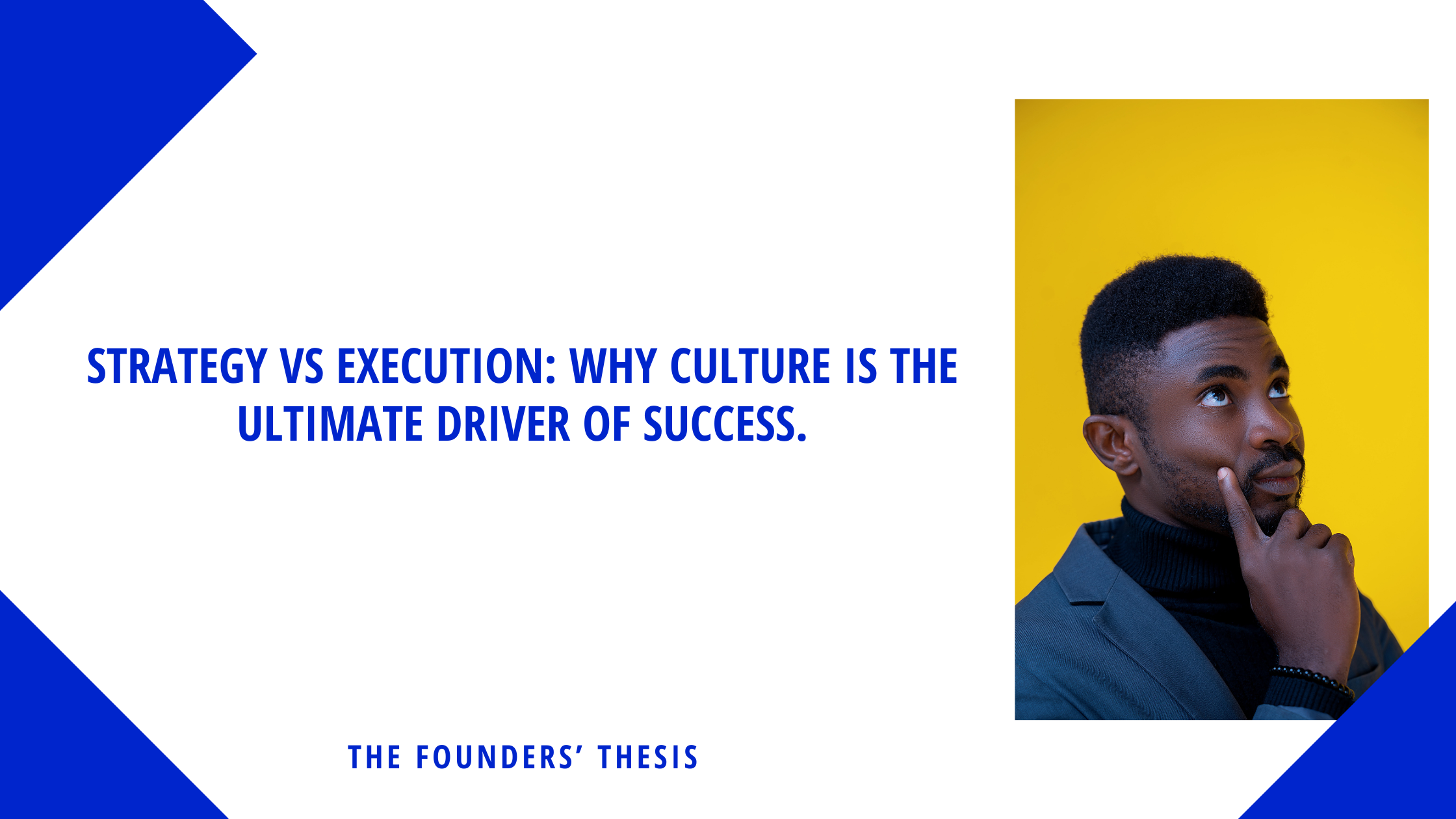In the pursuit of success—whether in startups, multinationals, public sector reforms, or even personal goals—there are two core variables that constantly battle for supremacy:
- Variable A: A brilliant strategy with zero execution—a beautiful failure.
- Variable B: A modest strategy with powerful execution—an unlikely triumph.
Yet, there’s an invisible third force that underpins both: Culture.
Variable A: The Myth of the Perfect Plan
We live in an age obsessed with strategy. Business schools churn out MBAs armed with frameworks like Porter’s Five Forces, SWOT analyses, and Blue Ocean strategies. Governments craft beautiful vision documents (remember Nigeria’s Vision 2020?), and startups pitch mind-blowing disruption ideas.
And yet—90% of strategies fail due to poor execution (Harvard Business Review, 2017). That’s not a typo.
- A 2022 PwC Strategy& survey of 6,000 senior executives showed that only 8% of companies are good at both strategy and execution.
- McKinsey notes that 70% of large-scale transformation programs fail, primarily because of execution gaps—not flawed strategies.
Variable B: Execution Eats Strategy for Breakfast
Peter Drucker’s famous saying holds: “Culture eats strategy for breakfast.” But let’s expand that—execution digests culture and excretes results. You can’t separate execution from culture, because how an organization or individual operates reflects their deepest values.
Consider this:
- Amazon didn’t have the best ecommerce strategy initially—but their obsessive commitment to execution (customer service, logistics, delivery timelines) crushed their competition.
- Toyota’s lean manufacturing system wasn’t the most glamorous strategy—but its relentless focus on operational excellence made it the most valuable car company in the world in 2021 (Statista).
Real-World Data:
- According to Bain & Company (2020), companies that excel at execution grow profits 2.5x faster than their peers.
- A study by Economist Intelligence Unit found that 61% of executives admit their firms struggle to bridge the gap between strategy and execution.
The True Linchpin: Culture
So what really tips the scale between a failed vision and a thriving mission? Culture. Specifically, a results-oriented, execution-first culture.
Culture isn’t about pizza Fridays or team-building retreats. It’s the DNA of how things get done.
Why Culture Wins:
- MIT Sloan Management Review found that companies with strong execution cultures outperform competitors by 30% in revenue growth and 20% in profitability.
- Organizations that promote accountability, ownership, and urgency see a 25-40% boost in productivity (Gallup, 2021).
This applies beyond business:
- In sports: No one predicted Greece would win Euro 2004. But a tactical, disciplined culture of execution over flair made them champions.
- In politics: Rwanda, once devastated by genocide, has climbed into one of Africa’s fastest-growing economies, largely due to a governance culture that prioritizes execution and anti-corruption.
Execution-Driven Culture: What It Looks Like
Let’s bring this home. Here’s what a results-driven culture entails:
| Element | Impact on Execution |
|---|---|
| Clear Accountability | Prevents finger-pointing; speeds up action |
| Radical Transparency | Promotes honest feedback and agility |
| Performance Mindset | Shifts focus from input to outcomes |
| Bias for Action | Reduces bureaucracy and decision paralysis |
| Learning Orientation | Accepts failure, iterates quickly |
If your team, startup, NGO, or even personal brand lacks these traits, no TED Talk-level strategy will save you.
Economic Consequences of Poor Execution
Let’s put this into a broader, global perspective:
- The global cost of poor execution in business is estimated to exceed $1 trillion annually (The Execution Premium, Kaplan & Norton).
- In Africa, poor project execution and corruption cost the continent over $150 billion annually, according to the African Union.
This isn’t just a company issue—it’s a macroeconomic tragedy. Economies with cultures of laziness, nepotism, or poor time discipline lose their demographic dividend, frustrate talent, and repel investment.
Conclusion: Culture is the Catalyst
You can craft the most dazzling vision deck, but without a culture that breathes execution, you’re just dreaming in PowerPoint. In contrast, even a half-baked plan can win if it’s backed by a tribe obsessed with results.
So, in your pursuit of success—whether you’re leading a team, building a startup, or running a nonprofit—ask not just “What’s the strategy?” Ask:
Do we have a culture that gets things DONE?
Because in the real world, done beats perfect.
📚 References
- Harvard Business Review (2017) – “Why Strategy Execution Unravels”
- PwC Strategy& (2022) – “Execution: The Missing Link in Strategy”
- McKinsey & Company – “The Keys to Organizational Agility”
- MIT Sloan Management Review – “How Culture Drives Financial Performance”
- Statista – Toyota’s Market Cap, 2021
- Gallup Workplace Survey (2021) – “State of the Global Workplace”
- The Economist Intelligence Unit – “Closing the Strategy Execution Gap”
- African Union (2021) – “Annual Loss to Corruption in Africa”
- Kaplan & Norton – The Execution Premium: Linking Strategy to Operations for Competitive Advantage
Written by: Oluwatosin Oguntunde
Thought Leader | Project Manager | Founder, Opportunity Gist





